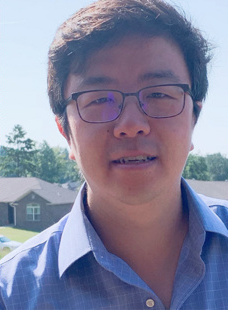Written by Anna Snader, a freshman at Hope studying Social Studies Education with an interest in English
Accompanied by soft piano music and the warm lights of Winants Auditorium, Michael X. Wang and Melissa Valentine read us their stories for the 40th anniversary of The Jack Ridl Visiting Writers Series.

First, we heard from Michael X. Wang, a fiction writer who grew up in the Shanxi province of China and immigrated to the United States when he was six. He began by explaining that in China, being a writer or a poet was considered an insult, translated to “someone who sits.” He first read a short story called “Cures and Superstitions” from his collection, Further News of Defeat. The anecdote follows the daily life of Ming and his father, who sell medicinal ingredients—including tiger bones—in a village. While a man from the city looks for medicine for his wife, he also tries to recruit Ming to come work in the city. The portion of the story ends with the weighing of the tiger bones. The city man jokingly asks if the weights are rigged, after seeing the bones don’t quite add up to the weight he requested. They respond that the weights are not rigged. After the man leaves, the father scolds his son, saying they use real weights for the people from the city. That line left us chuckling.
The second excerpt from Wang was from his novel, Lost in the Long March, which focuses on the Long March in China in the 1930s. The main character is tasked with detecting mines, walking with a machine on his back toward the mountains. The man overseeing this work gives detailed descriptions of the process, how to use the machine, and what to do if it stops beeping or the battery dies. The character follows these steps carefully, walking and listening to the steady beeps. While doing this, his mind wanders to reflect on his life, considering how even though he thought he would die, he didn’t want to without anyone to mourn him. At the end of the section, the character stops hearing the rhythmic beeping, remembers to put the flags on the ground, and begins to run. He realizes he is lost, no one is around, and he doesn’t know if he is safe.

Next, we heard from Melissa Valentine, author of The Names of All the Flowers (2020). Her memoir followed her life growing up in a racially-mixed family of eight, and her journey with grief after her brother, Junior, is imprisoned and later shot. She explained that she wanted to portray Junior’s humanity and honor all those who have died at the hands of gun violence. Valentine shared five different excerpts from her memoir, spanning her teenage and adult years. Her first excerpt was about when Junior went missing and came back from what she called, “out there”—the streets or the places beyond her family’s protection. Her second excerpt was about her shame and grief when she was unable to protect Junior from prison and the world. She reflects, “I believed our love made him different,” but she said that this inability to protect him was like losing.
Her third and fourth excerpts followed the aftermath of Junior’s imprisonment, a time of hope when she felt he had changed. One day, when she was at lunch with her sister, she observed the beauty of the flowers. She wished that she could transfer that beauty to her own life and to all those who were not free. In this part of the story, everything seemed resolved until she received a phone call where she learns Junior was shot. The final excerpt was from thirty-year-old Melissa reckoning with her grief and her decision to keep showing up to life, even though “one of them didn’t make it.” Valentine’s feelings of despair and hope resonated throughout the auditorium, and we were all left speechless.
After the readings, Wang and Valentine answered our questions about their writing processes.
What drew you to fiction? What did the research process look like?
Wang explained that he was unable to write poetry or non-fiction, so he decided fiction was his calling. He joked that in his attempt to write about his father, he was writing about his own experience. He mentioned how in his stories, he couldn’t avoid inserting politics because it is an essential part of China’s history. He explained that for his novel, he researched for two months and then worked on imagining what it would be like to live during that time.
Did you always want to write a memoir? When did you know you were ready? How did you navigate tension?
Valentine mentioned how she didn’t know she wanted to write a memoir. She kept trying to write a novel about a similar topic but realized it never felt right. When it came to being “ready” to tell her story, she said she was still not ready and she may never be. To navigate the challenging topics addressed in her book, she kept the book to herself for years before sharing it with her family. Although her parents were not supportive at first, they worked through it, and are proud of her and love her.
The stories we listen to and write–whether real or fictional–are powerful and true. Valentine and Wang’s stories exemplified the possibilities of writing and how we can also strive to create narratives that hold that same power. They offered their advice to us. Wang urged us to “go easy on [ourselves]” and to keep writing; the more we write, the less pressure because we have more work. Valentine said, “Don’t be afraid of your story. Be brave and treat it as your art.” To all writers, share the stories that are true to you, and believe they are important and beautiful.


